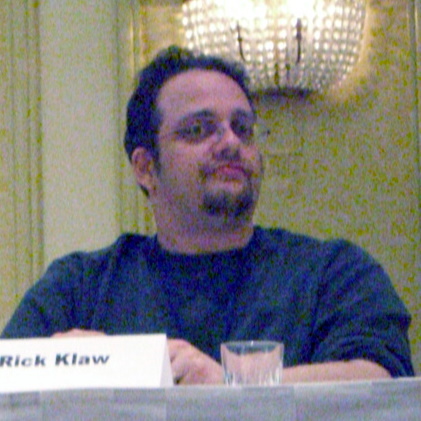I recently finished a short story anthology titled "Cross Plains Universe: Texans celebrate Robert E. Howard". It was the official book of the World Fantasy Convention 2006. I'm not sure what "an official book of a convention" means, but in practical terms it meant that every convention member got a free copy of it.
I haven't read anything by Robert E. Howard and don't really plan to, since barbarians are not really my thing; so I can't say that a tribute to Howard is of great interest to me. The main reason I read this anthology was for its social value. The FACT reading group was going to discuss it at one of their meetings. I thought this book might be worth reading as a facilitator for socializing with the FACT people. :-) Another reason I read it was because I kind of/sort of know many of those authors -- not very well, but I've run into many of them at various SF-related events in Austin, and talked with them on some occasions. So it was interesting to see what they werex like as writers.
There were two kinds of stories in the "Cross Plains Universe" anthology. One, stories about Robert E. Howard. Maybe I would have appreciated them more if I had known a fact or two from Howard's biography. The only one of those stories that amused me was "A Whim of Circumstance" by Mark Finn, because it's funny even if you (like me) know nothing about Howard and are not interested in his writing: this story stands on its own.
Rick Klaw's "A Penny A Word" also has a nice crypto-historical twist.

Rick Klaw at the Lone Star State of Fantasy panel at the World Fantasy Convention 2006, discussing other famous Texas fantasy writers besides Robert E. Howard.The second kind of stories in this book did not have Robert E. Howard as a character, so I can only guess the reason they were included was because they were written in Robert E. Howard's spirit or style. But I can't be sure because I haven't read anything by him.
From the tribute stories I inferred certain things about Howard's writing. Such as...
If my guess is correct, I got an impression that Robert E. Howard's stories
- were adventure fantasy (which I already knew);
- were often set in exotic countries;
- featured scheming seductresses who get men to do their will and then betray them;
- featured a quest for diamonds or some interesting artifacts hidden in chambers, and
- the chambers were guarded by supernatural beings.
Of several tales in "Cross Plains Universe" that featured these plot elements, I found Chris Roberson's "The Jewel of Leystall" to be more interesting than others, because the diamond turned out to be not what it seemed. There was even a slight science-fictional aspect to the story. Also, the centipedes were cool.
Oh, and (6): to a lesser extent Howard must have written about large apes as well, because two of the tributes featured such animals. That's a far lesser number than the number of stories about seductresses and diamonds, but still, there was a minor trend there.
Overall, this collection was a pleasant read -- none of the stories, except one or two, were actually boring -- but the reason why this book won't stick in my mind is because most of those tales seemed rather pointless to me.
Because?
Most stories seem unfinished, as if they were excerpts from a larger adventure
They were snippets of adventures that may make sense if they were chapters in a novel, and you could imagine that a resolution awaits a few chapters later. But the stories themselves were often without a resolution. Howard Waldrop's story about two guys who go to Mexico and see weird things there, or Jessica Reisman's story about two girls who get transported into a fantasy world, are examples of such. Too bad, because they are written quite amusingly -- they have cool "furniture" (to borrow a phrase from Walter Jon Williams). It's just that you expect something important, life-changing to happen to the characters, or at least something that would justify the whole adventure... or barring that, an unpredictable plot twist... and nothing happens. The very first story in the book, about a Roman warrior who encounters ghosts in the forest, is another example of a pointless adventure. And it does not even have cool furniture.
Of all the adventure stories, the one I liked the most was Lawrence Person's "The Toughest Jew in the West", because it does have a meaningful and somewhat unexpected ending.
Can this book inspire one to read Robert E. Howard? Hardly.
Was this book supposed to inspire me to read Robert E. Howard? If so, it failed. Then again, the idea of judging the quality of Robert E. Howard's work from the tribute stories reminds me of a joke that used to be popular in $my_home_country. This joke is usually told about a certain ethnic group, and it's not fair to it (as if any joke is), so I need to scrub it of all the references to that ethnicity. So let's say the characters were named simply Bob, Joe and Jim.
Bob tells Joe that Luciano Pavarotti is in town on a tour, and will sing in a local opera production for one night. He grumbles over the fact that he can't afford the outrageously expensive tickets. Joe says: "You're not missing much: Pavarotti can't sing worth crap. I know -- Jim sang one of his arias for me over the phone".
Now that I think about it, what I find fascinating about this joke is not so much its punchline, as its premise: a bunch of ordinary, straight guys fretting about not being able to go to opera! This joke would not make any sense in the US. Did I grow up in a strange place and time, or what?
No comments:
Post a Comment